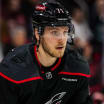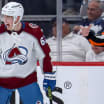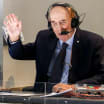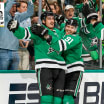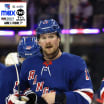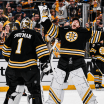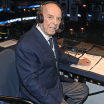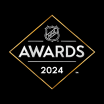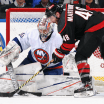Legendary hockey reporter Stan Fischler writes a weekly scrapbook for NHL.com. Fischler, known as "The Hockey Maven," shares his humor and insight with readers each Wednesday.
With the Stanley Cup Playoffs underway, Fischler focuses on two unique Chicago Black Hawks teams that made surprising postseason runs.
Black Hawks made two postseason runs 15 years apart with unique coaches
Baseball umpire led Chicago to 1938 Stanley Cup; Abel had dual role in 1953
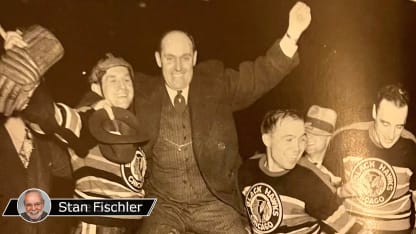
By
Stan Fischler
Special to NHL.com
Just 15 years apart, Chicago Black Hawks fans were treated to a pair of runs in the Stanley Cup Playoffs that captured the imagination of a sports-mad metropolis. Part of the allure was that each team thrived despite a unique coaching situation.
Coached by MLB umpire Bill Stewart, the 1938 Black Hawks finished the regular season well under the .500 mark (14-25-9) yet somehow regrouped in the postseason and won the Stanley Cup.
Then in 1953, former Detroit Red Wings great Sid Abel joined the Black Hawks as a player/coach and led them on a surprising postseason run that fell short of the championship.
"They were weird teams in different ways," Frank Boucher once told me. Boucher briefly played against the '38 Black Hawks and managed the New York Rangers against the '53 club.
"It was hard to imagine that a famous umpire would be a successful hockey coach," Boucher said. "Then, again, you'd be hard-pressed to find more than a couple of player-coaches in NHL history."
Playing in the American Division in 1937-38, the Black Hawks were mocked by some critics because of ownership's new club policy. The patriotic Major Frederic McLauglin -- an American World War I hero -- insisted that their roster include a sprinkling of United States-born players.
This was at a time when there were precious few U.S.-born players in the NHL. Some owners and managers -- the Rangers' Lester Patrick among them -- were critical of McLaughlin's decree. So were some players.
"We thought the 'American Plan' was pretty ridiculous," complained the Black Hawks best forward, Johnny Gottselig.
Undaunted, the Black hawks signed Eveleth, Minnesota goalie Mike Karakas to an NHL contract. Other Americans invited to the Black Hawks camp included Curly Brink, Cully Dahlstrom, Fido Purpur and Doc Romnes. All eventually were inducted into the U.S. Hockey Hall of Fame.
"Those Americans were not world-beaters," Boucher said, "but they were darn good hockey players, especially Karakas."
The Black Hawks, though, hardly had the look of a champion.
They barely qualified for the postseason and were the only playoff team with a losing record.
The Black Hawks played the Montreal Canadiens in the first round and lost the opener 6-4 at the Montreal Forum. But Chicago was not concerned about the Game 1 loss heading back home in the best-of-3 series.
"This was the happiest team I ever saw in professional sports." Stewart said. "And we had some pretty good talent, too."
Karakas helped the Black Hawks shut out the Canadiens 4-0 in Game 2. Thanks to Lou Trudel's overtime goal in the decisive third game, Chicago won the series.
To those who thought that the first-round triumph was a fluke, the Black Hawks then defeated the previously red-hot New York Americans in three games to reach the Stanley Cup Final.
They played the Toronto Maple Leafs in the Final and again the Black Hawks were the underdog. Worse yet, Karakas, suffered a broken big toe in Game 3 against the Americans and could not fit his foot into his skates.
Scrambling for a replacement, the Black Hawks signed minor league goalie Alfie Moore and he helped them defeat the Maple Leafs 3-1 in Game 1. When Toronto hockey boss Conn Smythe successfully objected to Moore playing again, Chicago tried minor leaguer Paul Goodman, who was in goal for a 5-1 loss in Game 2 of the best-of-5 series
By this time, Chicago's training staff had outfitted Karakas with a special skate to protect his broken toe, and it worked. He helped the Black Hawks win the next two games, 2-1 and 4-1, to secure the second Stanley Cup championship in franchise history. And the first with a baseball umpire as coach!
The Black Hawks made another interesting choice to coach in 1952-53, when they acquired Abel, who was considered by the Red Wings to be at the end of his playing career.
"I had a young stud center named Alex Delvecchio ready for the NHL and Sid was expendable," Red Wings manager Jack Adams explained.
Detroit sold Abel to Chicago whereupon Black Hawks boss Bill Tobin announced that Abel not only would take his turn at center but coach, as well.
"I still figured I had a few more goals on my stick," Abel said, "and believed that I could coach these guys as well."
Abel knew he was up against heavy odds trying to get the Black Hawks into the playoffs. They hadn't made it since 1945-46.
"Nobody figured we'd do much better this time around, but we managed to stay close to the pack," Abel said.
More deals with the Red Wings helped the Black Hawks reach the playoffs. Defenseman Lee Fogolin and forwards Jim McFadden, Jim Peters, George Gee and Gerry Couture joined Abel in Chicago.
"Best of all, we were strong in goal and that made a difference," Abel explained.
Al Rollins was acquired from the Maple Leafs. As a 1951 Cup-winner, Rollins shared the Vezina Trophy with Turk Broda. But Maple Leafs boss Conn Smythe wanted Harry Lumley to be the goalie and Rollins was traded.
The Black Hawks finished under .500 (27-28-15) but in fourth place, edging the Maple Leafs for a playoff berth.
Their reward was a semi-final series against the Canadiens, led by Maurice "Rocket" Richard. And Chicago lost the first two games on the road.
"We knew we weren't dead yet," Rollins later told me. "Home ice would be a blessing for us."
He was right. The Black Hawks won two straight at Chicago Stadium and then stunned the hockey world by winning Game 5, 4-2, at The Forum. The Blackhawks were one win from reaching the Cup Final for the first time since winning the title in 1938.
Meanwhile panic took over the Canadiens camp. Their goalie, Gerry McNeil, was badly faltering and a nervous coach Dick Irvin struggled for a solution.
"My father was sure that he'd be fired if he lost," wrote Dick Irvin, Jr. in his book, 'The Habs.' "But his team saved his job."
Actually, it was one player. Scratching McNeil from the lineup, coach Irvin gambled on rookie goalie Jacques Plante, who had played only three NHL games.
If Irvin was nervous, the rookie was not. With the score tied 0-0, in Game 6, he stopped a Chicago breakaway and every other shot fired at him. Montreal won 3-0 and then -- behind Plante -- took Game 7 at home, 4-1.
"We gave them our best shot," Abel concluded, "but once Plante stopped that breakaway in the sixth game, the Canadiens couldn't be stopped."
It was a stunning end to an unexpected playoff appearance, not unlike the shocking playoff run under Stewart in 1938.
"The big difference," Abel conceded at the end, "was that we never made the second round."
